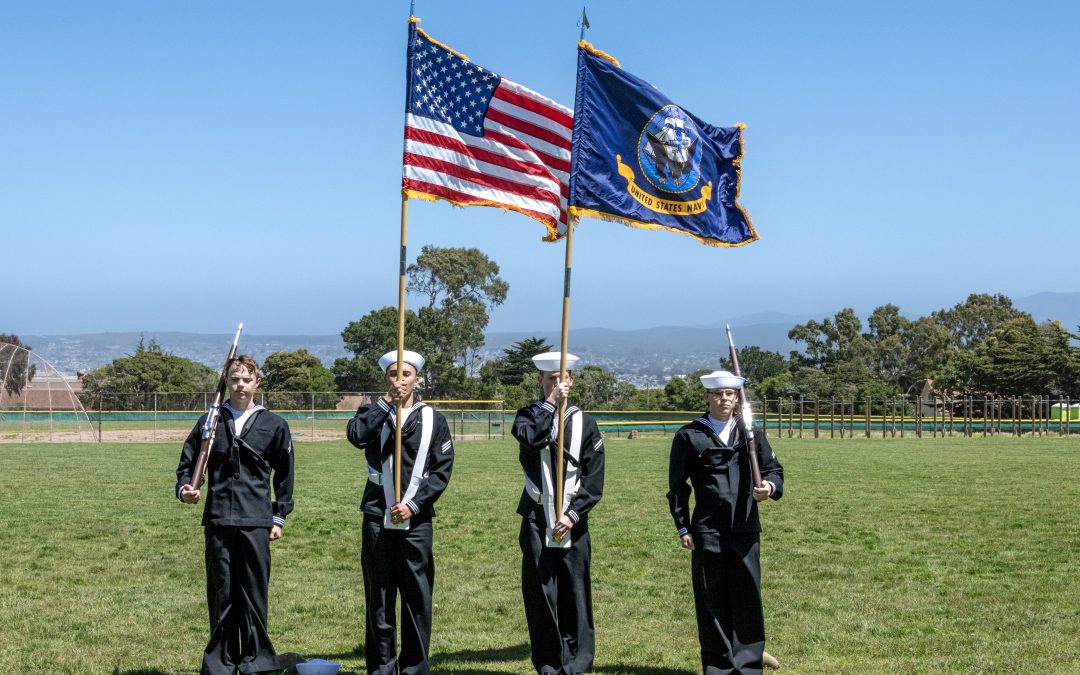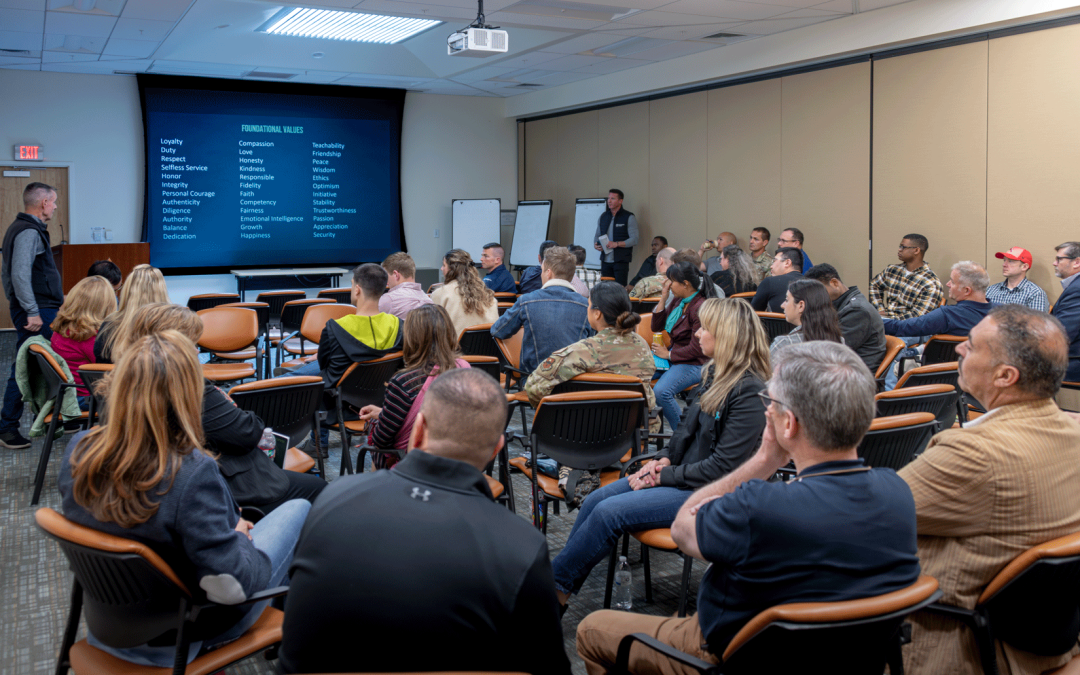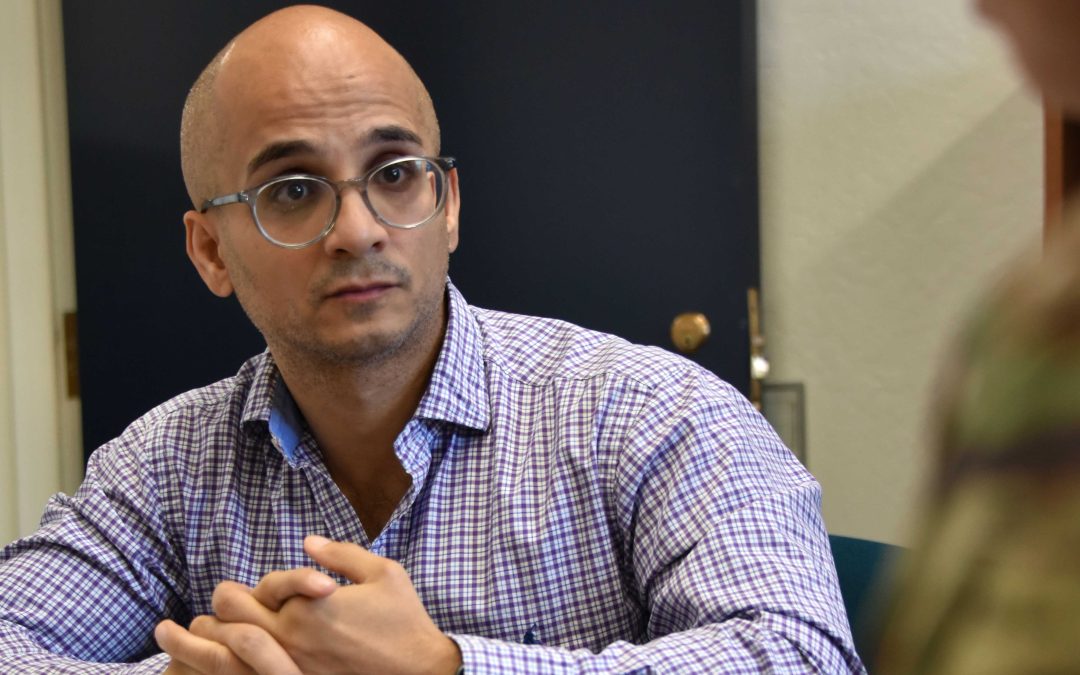By Natela Cutter
DLIFLC Public Affairs
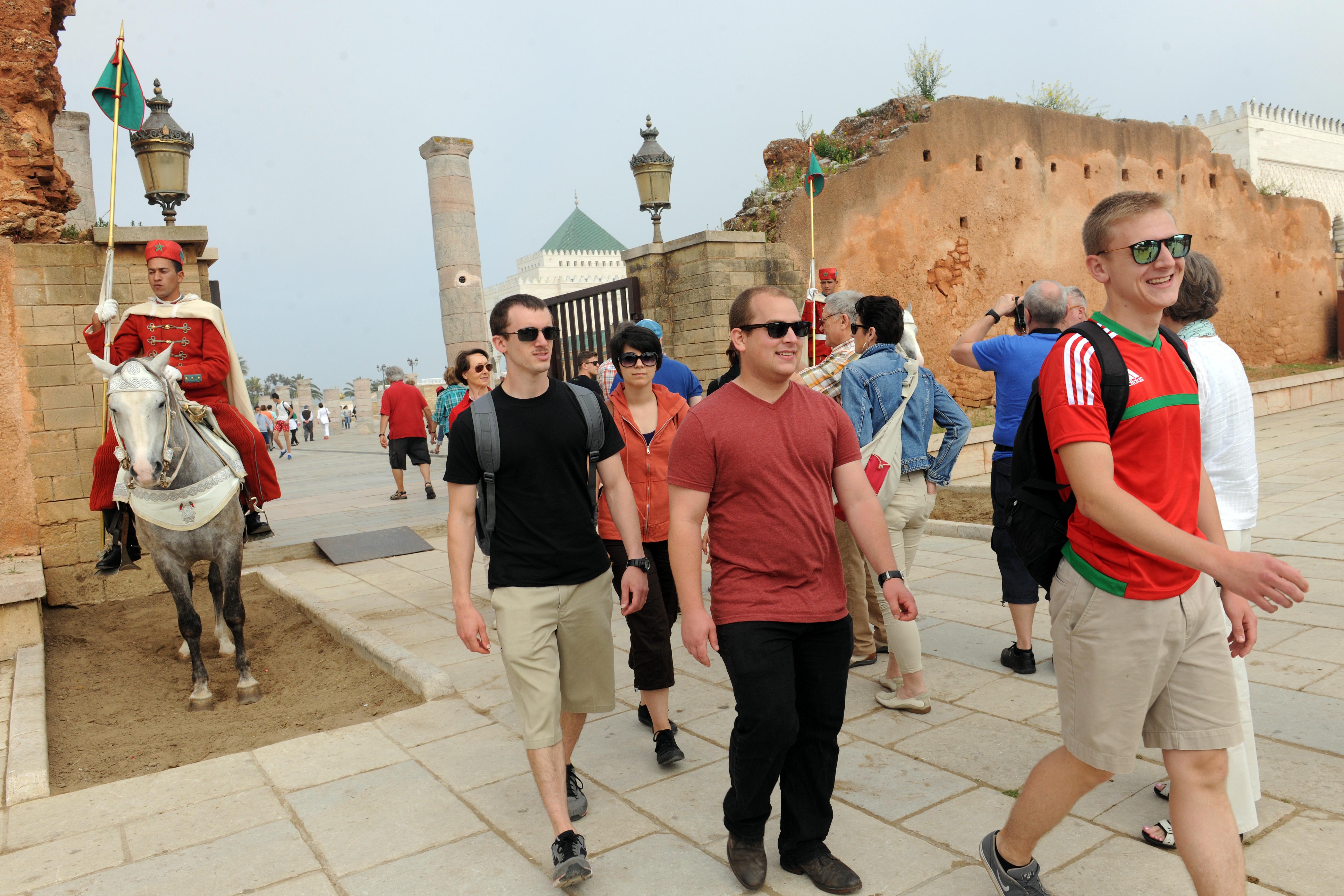
Students visit the mausoleum of Mohammed V in central Morocco, a central tourist attraction in Rabat, Morocco. (Photo by Natela Cutter)
RABAT, Morocco – Lance Cpl. Paul Smith never imagined that one of his most challenging language instructors would be a two-year-old. In fact, just a few years ago, Smith never thought he would be studying Arabic, let alone attend one of the nation’s most difficult military schools, the Defense Language Institute Foreign Language Center in Monterey, California.
“While studying Arabic in the classroom, I never realized the concept behind the word ‘ball.’ Thanks to Riad, now I know that it can be anything that resembles something round,” said Smith speaking about his host family’s two-year-old boy. Smith returned in April from a month-long immersion trip to Rabat, Morocco where he attended classes at local language school and had an opportunity to be immersed in the culture.
With a student body of about 3,500 military service members studying some two-dozen foreign languages, DLIFLC currently sends more than 15 percent of its student body on immersion trips and plans to increase that number gradually over the next five years.
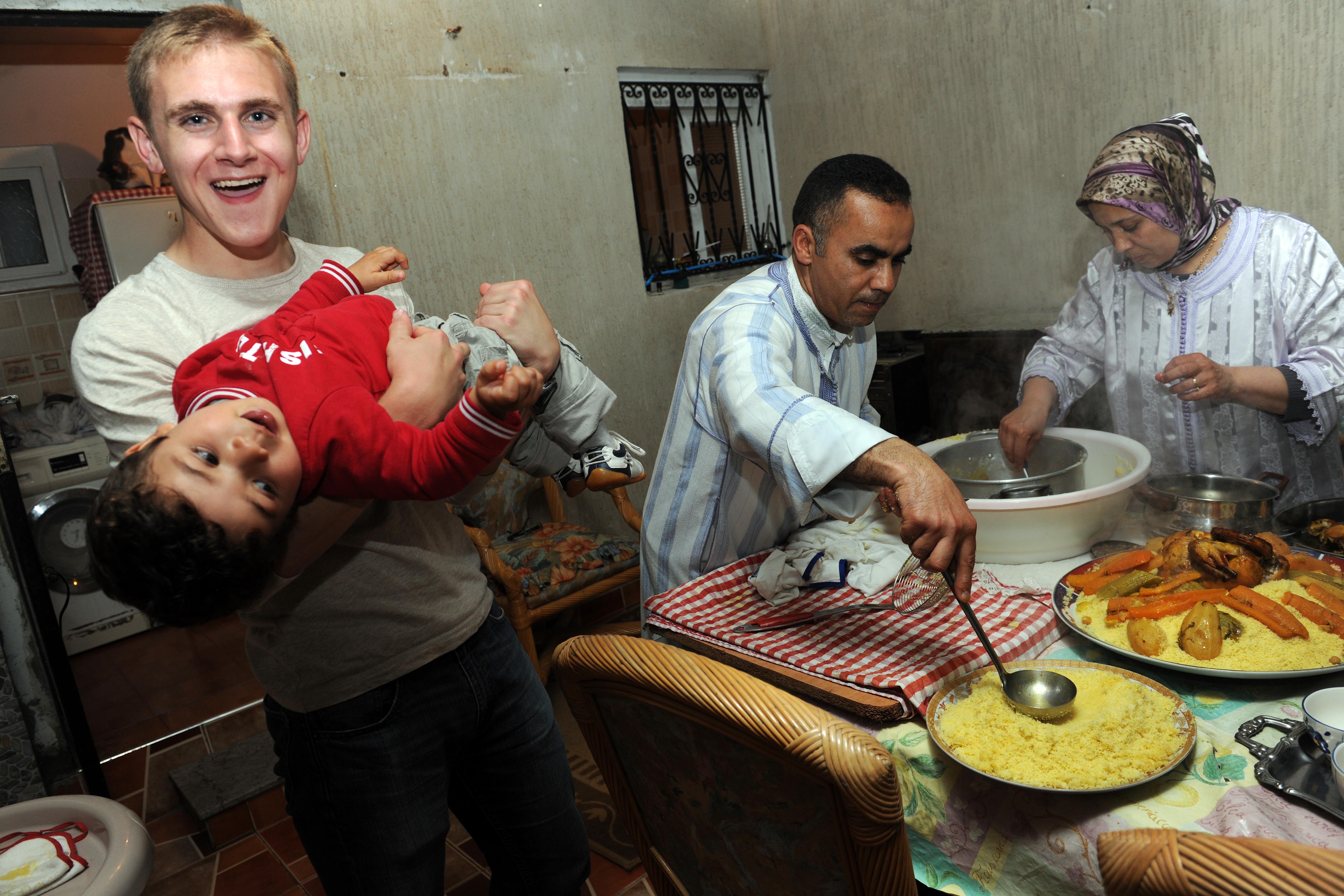
Lance Cpl. Paul Smith holds two-year-old Riad in his arms, his host family’s son, while Aisha and Hussein Boudrar prepare a delicious meal of traditional couscous with vegetables and chicken. (Photo by Natela Cutter)
“I am deeply convinced that sending students on in-country immersions is critical to language acquisition,” said DLIFLC Commandant Col. David K. Chapman. “Students not only have the opportunity to practice their language but gain in confidence and are exposed to the culture, sights, sounds, historical places, food, people and way of life. This can’t be replicated anywhere.”
For Smith and 10 of his classmates who traveled to Morocco, the trip was an experience of a lifetime. “There is no book you can learn this from, this is real, you can touch it, see it, feel it,” said Smith, standing before the mausoleum of Mohammed V, in central Rabat.
During the day, the students diligently attend a local Arabic Language Center where the curriculum is taught by highly educated Moroccan instructors and topics range from politics to economics, history, and culture and beyond.

Students bargain with a shoe merchant at an open air market in Fez, a historic Moroccan city located some 120 miles east of Rabat, the capital of Morocco. Students spent a weekend touring the ancient city with a professional guide who only lectured in Arabic to students. (Photo by Natela Cutter)
“When we moved to Morocco I immediately realized that there was no school for foreigners to learn Arabic,” said *Malaika Franklin. “It started as small project in 2007 and today we have more than 150 students per year who come from dozens of countries around the world to study Arabic or colloquial Moroccan Arabic,” said Franklin, adding that their program is based upon a communicative and immersive curriculum, with class sizes up to eight students.
“One of the most important things for me as a foreigner here was safety. I wanted to make sure that the students who come here feel completely secure and comfortable,” she said, adding that the center takes charge of the students from the moment they land until the day they depart.
“We pay close attention to their accommodations with host families, making sure that they have all the amenities that were promised, with adequate sleeping quarters, meals, etc. We also make sure the host families spend time speaking Modern Standard Arabic with them.”
For Smith, staying with his host family not only improved his fluency in Arabic but also left a deep impression.
“Before, I had a closed world-view. This experience opened my eyes and gave me humility. Now I understand that things are not really the way we see them, on TV for example. Wherever I go, I will be opened minded about everything and never judge based upon what it ‘appears’ to be, before I have experienced it.”
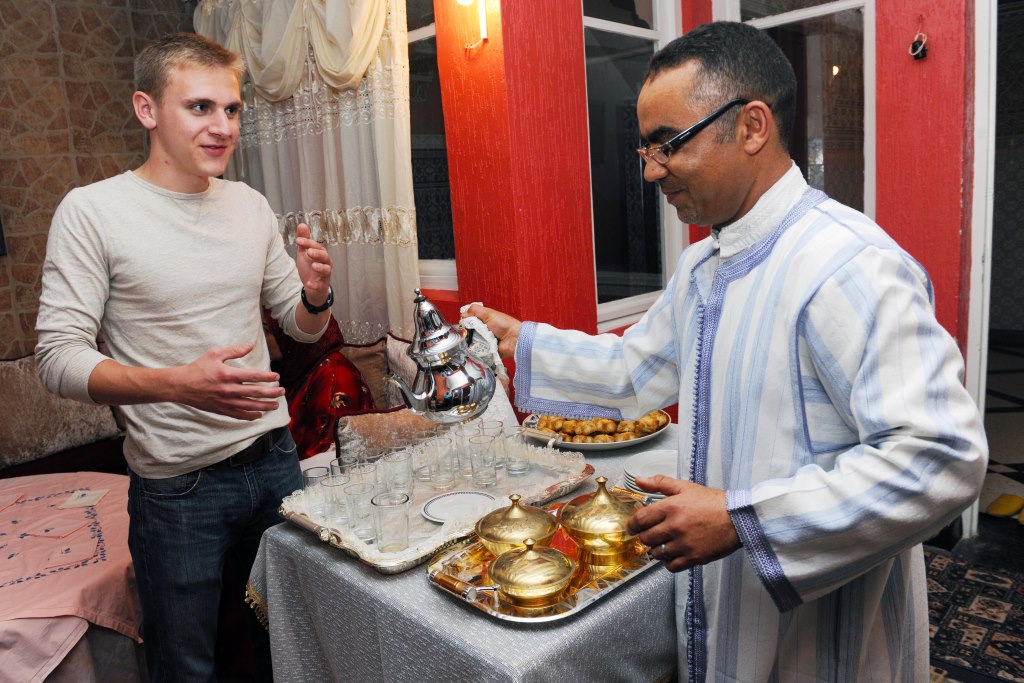
Lance Cpl. Paul Smith speaks with his host father, Hussein Boudrar, as he pours mint tea into glasses in his home in Rabat, Morocco. (Photo by Natela Cutter)
Arabic Language Center is situated near down town Rabat, in an area that houses most of the capital’s embassies. The modern two-story home is decorated with Moroccan style ceilings, plush sofas, a library, language labs, and large comfortable classrooms. The highlight, however, is the Bedouin tent in the backyard where students can drink tea, eat lunch, and relax during breaks.
“We offer breakfast and lunch on a daily basis. The meals are traditionally Moroccan and the students have the opportunity to enjoy authentic food prepared right here in our kitchen,” said Franklin. “We give students an opportunity to experience what it is like to live in an Arabic culture and to be able to use the language functionally in a natural setting.”
Structured class begins at 8 a.m. and normally finishes about noon. In the afternoons, the school organizes lectures by guest speakers or provides excursions to museums, universities, and other locations in town. On the weekends, the students embark on trips to nearby historic cities and are provided guides who lecture exclusively in Modern Standard Arabic.
“There is no rest here,” said Franklin with a chuckle. “Contrary to popular belief, we make the students work hard because we know that the stakes are high when they get home and that their final exam is very difficult.”


